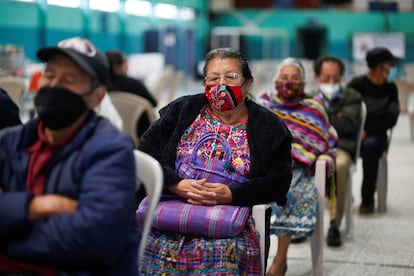Spain backs Biden’s proposal for vaccine patent waivers
PM Pedro Sánchez’s support is in contrast with the opposition voiced by Berlin and the cool attitude from Brussels

The proposal by the administration of US President Joe Biden to waive patents on Covid-19 vaccines caused widespread division among European countries on Thursday. Spain has opted to unreservedly support the proposal, which is aimed at increasing access to the inoculations in poorer nations and stopping the pandemic in its tracks. France and Germany, meanwhile, have declared their opposition to the plan, on the basis that it will not solve the problem of distributing the vaccines and could in fact make it worse.
The backing by the government of Prime Minister Pedro Sánchez was enshrined in an unofficial document that the Spanish delegation will present at the European summit due to be held on Friday and Saturday in Oporto, Portugal. The text states that “intellectual property cannot be an obstacle to bring an end to Covid-19 and guarantee equitable and universal access to vaccines.”
Spain is calling for “an urgent consensus on the proposal to temporarily lift certain obligations under Trade-Related Aspects of Intellectual Property Rights,” known as TRIPS in English.
At the end of last year, India and South Africa presented a similar initiative at the World Trade Organization (WTO), but the proposal was blocked for months by members where the vaccines are being manufactured, such as the European Union, the United Kingdom, Switzerland and the United States. The sudden change in stance by Washington on Wednesday has revived the debate and has brought new hope for those who are in favor of the patents being waived.
Waiving vaccine patents would not have any effect today. What is urgent is the export of vaccinesClément Beaune, French minister of state for European affairs
“The Biden administration has openly raised the question of the temporary exemption of the TRIPS agreement and this announcement leads the path that was already begun by India and South Africa at the WTO,” sources from the Spanish government stated.
The path, however, appears to be less clear than Spain was expecting. Germany, the country where BioNTech-Pfizer – so far the most successful vaccine – was developed, expressed its complete opposition to Biden’s plan on Thursday. The German chancellor, Angela Merkel, said that “the protection of intellectual property is a source of innovation and should continue to be so in the future.” Berlin added that the waiver of patents, which would allow any pharmaceutical company to replicate the Covid-19 vaccines, could have “serious implications” for global production.
France, which has yet to develop a Covid-19 vaccine despite counting on powerful pharmaceutical companies, also reacted coolly to the proposal. “Waiving vaccine patents would not have any effect today,” said the French minister of state for European affairs, Clément Beaune. “What is urgent is the export of vaccines,” he continued, adding that this exportation “is what the EU does, not the US.”
The European Commission reacted in a similar way. The European Commission (EC) president, Ursula von der Leyen, diplomatically took up the gauntlet from Biden, and said that she was “prepared to debate” any pragmatic proposal aimed at improving the distribution of vaccines throughout the world. But she pointed out that the short-term solution would be for all major vaccine producers to allow for doses to be exported – a clear allusion to countries such as the United Kingdom and the United States which, either expressly or tacitly, are impeding these medications from leaving their territories. The EU, meanwhile, has permitted the export of 200 million doses, the same amount as have been distributed among the bloc’s 27 member states.
Spain’s position goes much further than that of the EC and is in clear conflict with Berlin and Paris. The document that the Sánchez government will be taking to the Oporto summit defends that “the production and access to the vaccines should be increased exponentially and urgently.” Spain points out that 11 billion doses are needed to immunize 70% of the world population on the basis of two shots per person. And that with the current level of production, estimated at between 6.5 and 8.5 billion doses a year, “there will not be sufficient vaccines for the global population until 2023 or 2024.”
The government of Pedro Sánchez considers these timescales to be unacceptable, both in terms of fairness and justice for developing countries, as well as healthcare reasons affecting the whole planet. “No one will be safe until all of us are safe,” the document states.
Spain is proposing that for the production process to be accelerated, and while the waiver of patents is negotiated, “all mechanisms should be activated to promote and incentivize voluntary license agreements,” which would allow pharmaceuticals to agree the production conditions among themselves.
English version by Simon Hunter.
Tu suscripción se está usando en otro dispositivo
¿Quieres añadir otro usuario a tu suscripción?
Si continúas leyendo en este dispositivo, no se podrá leer en el otro.
FlechaTu suscripción se está usando en otro dispositivo y solo puedes acceder a EL PAÍS desde un dispositivo a la vez.
Si quieres compartir tu cuenta, cambia tu suscripción a la modalidad Premium, así podrás añadir otro usuario. Cada uno accederá con su propia cuenta de email, lo que os permitirá personalizar vuestra experiencia en EL PAÍS.
¿Tienes una suscripción de empresa? Accede aquí para contratar más cuentas.
En el caso de no saber quién está usando tu cuenta, te recomendamos cambiar tu contraseña aquí.
Si decides continuar compartiendo tu cuenta, este mensaje se mostrará en tu dispositivo y en el de la otra persona que está usando tu cuenta de forma indefinida, afectando a tu experiencia de lectura. Puedes consultar aquí los términos y condiciones de la suscripción digital.








































